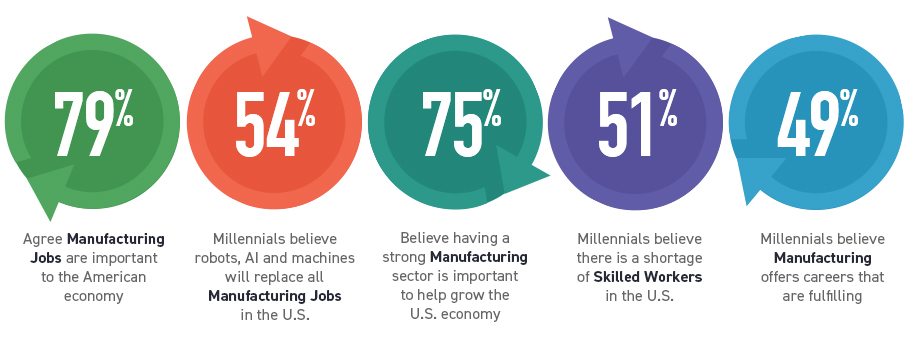
February 12, 2019
by Keith Barr, Leading2Lean
Change and adaptation are unavoidable to any business that strives to be sustainable. However, not all changes are created equal. Some are swift and barely noticed, others are major shifts that bring great disruption.
Right now, the manufacturing industry is facing a monumental change, one that will determine the future of the industry in the U.S. This coming change will lead to radically new workplace cultures, new applications of technology, and entirely new systems. But make no mistake, this change is a human revolution.
Welcome to Millennials in Manufacturing 101.
It’s enough to send a chill down the spine of every manager in manufacturing. The most misunderstood generation in history is about to be the driving force in manufacturing.
There’s a lot of talk about Millennials’ lack of interest in manufacturing jobs. Many question whether there will be enough participation in the U.S. manufacturing industry for it to survive into the next century.
These concerns are both valid and warranted. The data has spoken, and it is not what our industry wants to hear. According to The Manufacturing Institute, it’s estimated that 3.5 million manufacturing jobs need to be filled in the next decade and, if the industry doesn’t adapt, two million of those jobs will go unfilled[i]. That’s two million empty workstations, two million “for hire” postings, and two million missed opportunities.
My company, Leading2Lean, wanted to understand why those jobs will go unfilled. We wanted to define baseline public perceptions on the manufacturing industry and measure the interest levels among Millennials in choosing manufacturing as a career. We conducted a survey that examined the perspectives of three different generations. These generations were the Millennials (born between 1981-1998), Generation X (born between 1965-1980), and the Baby Boomers (born between 1946-1964). Leading2Lean commissioned survey provider Engine to conduct the survey, which polled 1,002 Americans demographically representative of the U.S. and at a 95% confidence level.

The results revealed significant differences in opinions by generation that explain why so many jobs are expected to go unfilled in next 10 years. When the respondents were asked whether they agree that manufacturing jobs are important to the U.S. economy, 86% of both Baby Boomers and Generation X agreed that manufacturing jobs are important, compared to only 68% of Millennials. When compared to older generations, Millennials aren’t convinced that manufacturing is integral to having a strong U.S. economy.
When asked about whether they agree that there is a shortage of skilled workers in the U.S., 60% of Baby Boomers and 63% of Generation X agreed that there is a shortage, compared to just 51% of Millennials. Not only are Millennials less convinced with the notion that manufacturing is important to the U.S. economy than other generations, but they are also less aware of the skills gap and the number of readily available jobs.
Lastly, when asked if they agree that the manufacturing industry offers fulfilling careers, 59% of both Baby Boomers and Generation X agreed that the careers are satisfying, while only 49% of Millennials agreed. That’s right – less than 50% of Millennials believe that manufacturing offers desirable careers.
These are the current understandings of our industry. It’s a sobering picture. Clearly, there needs to be a change.
However, there is good news, too. Current changes in manufacturing, including the new, dynamic use of technology on the plant floor that inspires creative and collaborative problem solving, has the power to attract the new workforce the industry desperately needs.
Millennials are well-positioned to thrive in these new manufacturing environments. They’re fluent with technology, they’re coming from educational backgrounds that have emphasized teamwork more than other generations, and they’re comfortable with using data to improve processes on the plant floor. I’ve seen this throughout my career, where young people have entered manufacturing positions and with proper training, have quickly adapted and thrived. I sincerely look forward to the innovations that Millennials will bring to the industry.
Smart companies are recognizing that Millennials are the future, and they’re adjusting workplaces to make them highly attractive to the younger generation. Our industry must do the same. This means taking a critical look at our workplaces, and seeing where improvements can be made towards modernizing technology, recruiting strategies, job training, and workplace culture.
Our industry must also share that manufacturing is not a forgotten, antiquated factory, but a hub of technological innovation. It’s an industry that offers competitive pay, even comparable to the tech sector[ii]. We must share this information online and at schools, conferences, and recruitment events to reach Millennials where they’re at.
As the old saying goes, knowledge is power. If we succeed in showing Millennials what the manufacturing industry is really like, our entire industry will change. For the better.
To view the results of the survey, please visit www.leading2lean.com/leading2lean-manufacturing-index/. To learn more about Leading2Lean, please visit www.Leading2Lean.com.
 About Keith Barr
About Keith Barr
Keith Barr is an experienced and informed authority on the challenges and changes currently impacting the manufacturing industry. He is President and CEO of Leading2Lean, a manufacturing software technology company and creator of CloudDISPATCH.
Keith has deep experience as a senior executive in the technology industry and as a turn-around expert. He has worked in maintenance and logistics, CRM, IT Service Management, cloud-based solutions and product development. Companies include Ivanti, Echopass, Sento and Sykes.
For the U.S. Air Force, he was tasked with turning around numerous units in maintenance and logistics through process improvement and culture change. This experience is the foundation of Keith’s desire for continuous improvement based on the merger of machine and human potential. He is a 20-year veteran of the Air Force.
Keith believes that manufacturing can only survive by evolving and adapting to new technologies and new lean methods. He insists that plant managers need truth, rather than simply data. Solving problems on the factory floor requires employee engagement, aligning of management objectives, and creating an environment that promotes constant enhancement of product and process.
[i] http://www.themanufacturinginstitute.org/~/media/827DBC76533942679A15EF7067A704CD.ashx
[ii] https://www.glassdoor.com/Salaries/director-of-manufacturing-salary-SRCH_KO0,25.htm
Scott Ellyson, CEO of East West Manufacturing, brings decades of global manufacturing and supply chain leadership to the conversation. In this episode, he shares practical insights on scaling operations, navigating complexity, and building resilient manufacturing networks in an increasingly connected world.